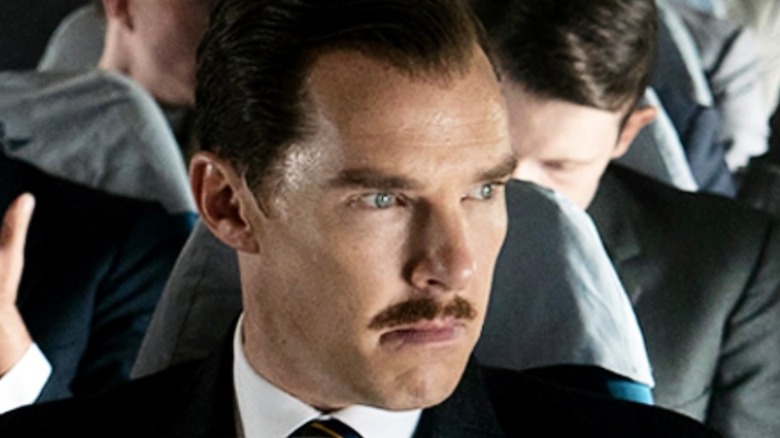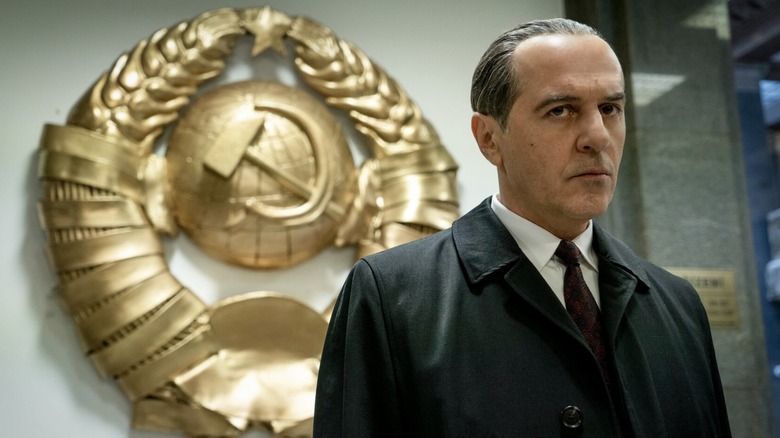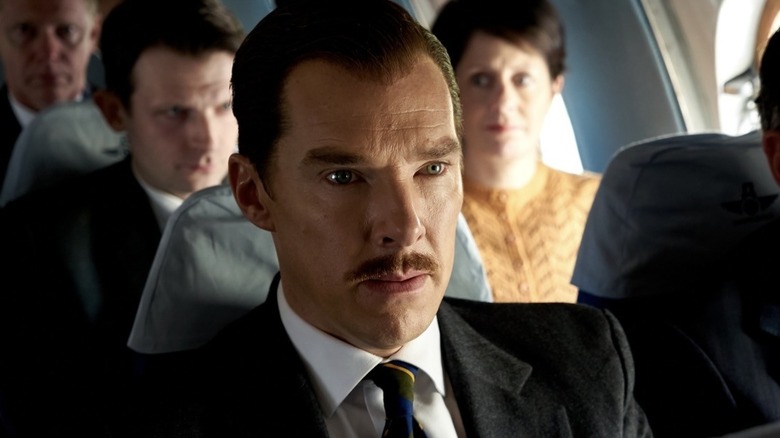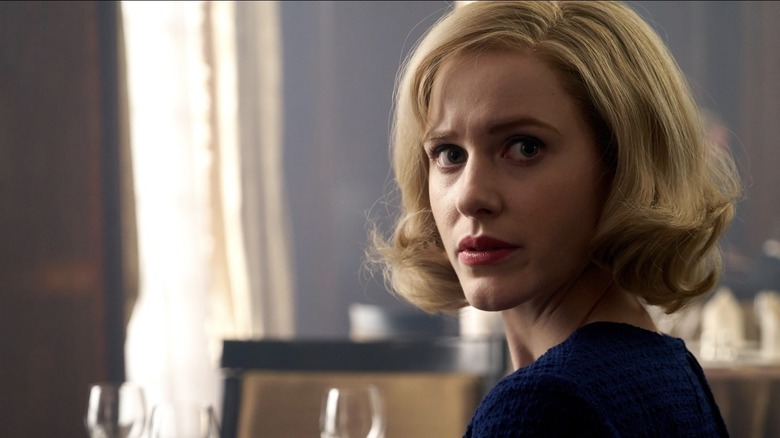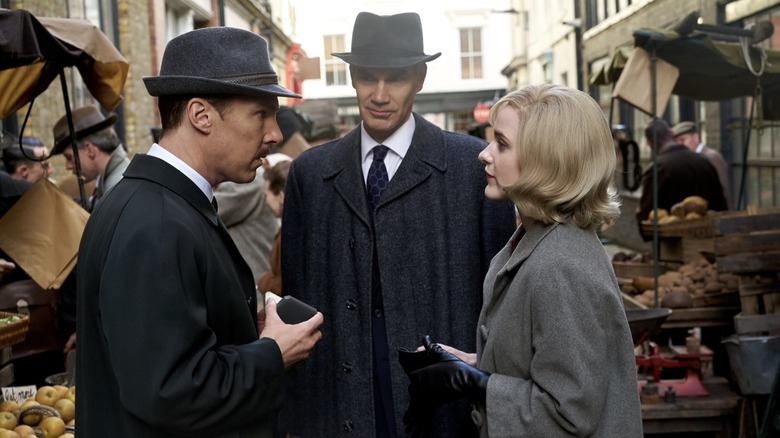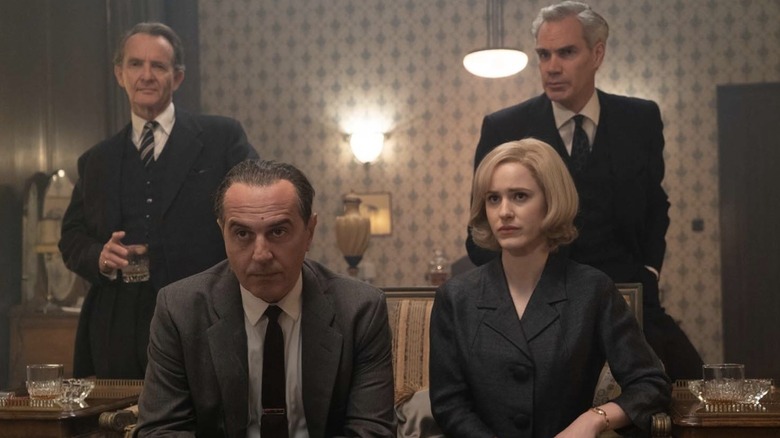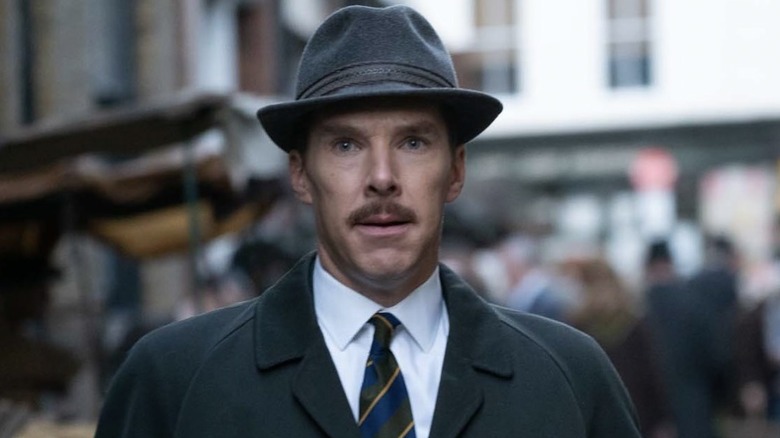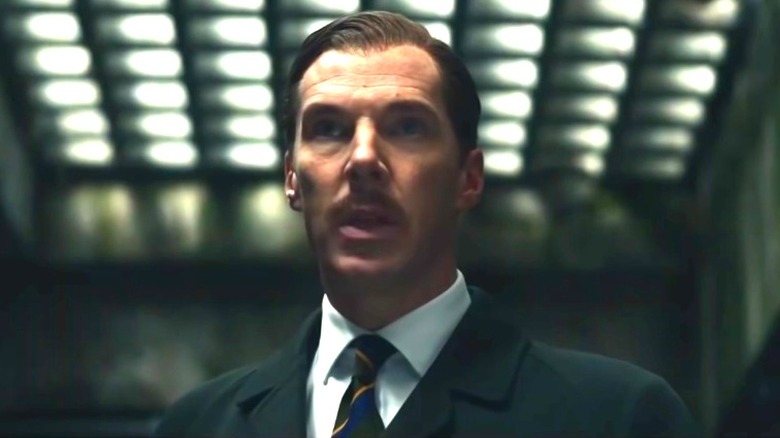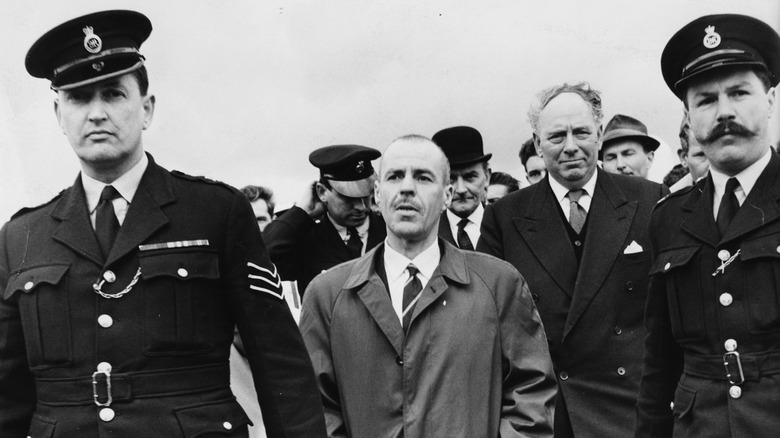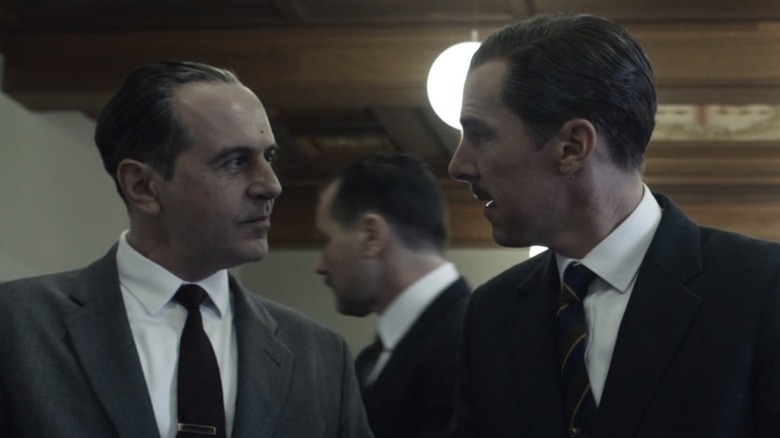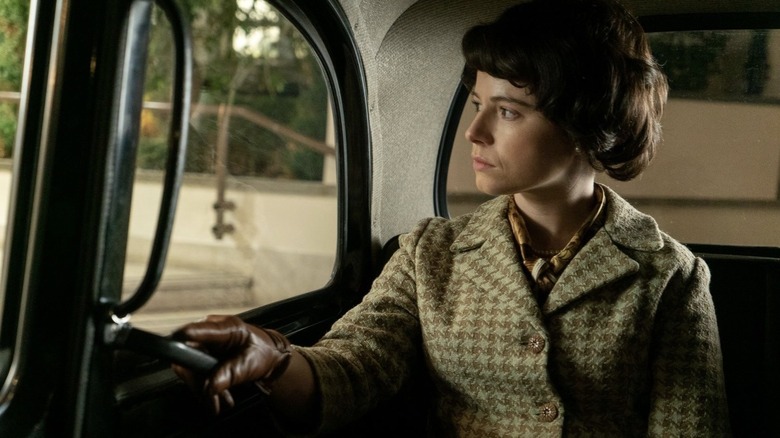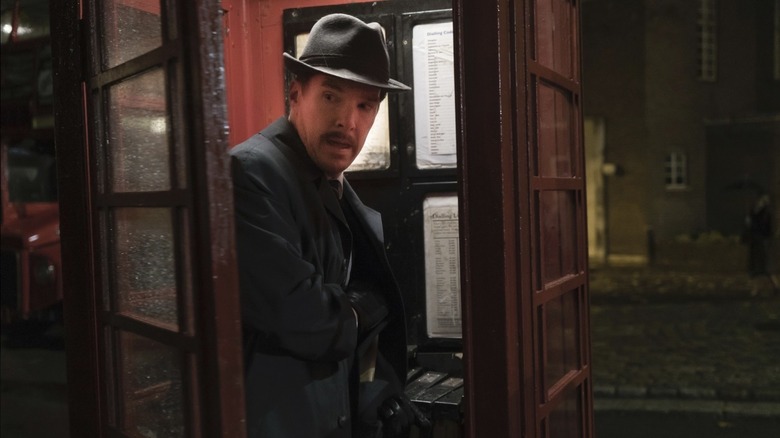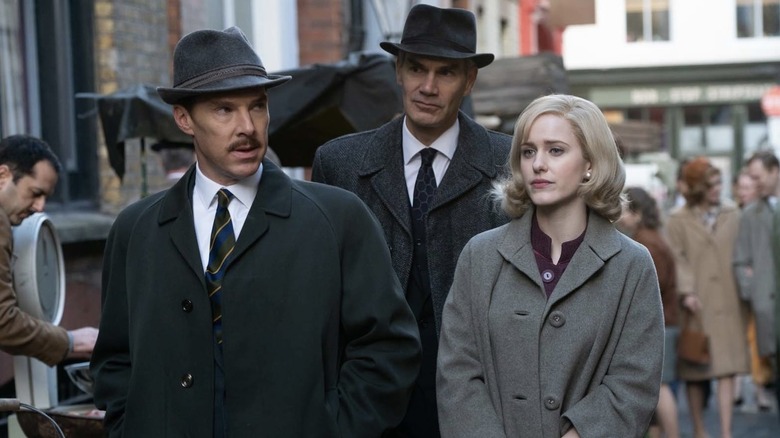Everything The Courier Doesn't Tell You About The True Story
Warning: This article contains spoilers for the movie "The Courier."
"The Courier" is a Cold War espionage film based on the true story of Greville Wynne (Benedict Cumberbatch), a British businessman recruited by British Secret Intelligence (MI6) to act as a courier of sensitive material from a top-level Soviet officer in Moscow. Between 1960 and 1962, Colonel Oleg Penkovsky (Merab Ninidze), met with Wynne in Moscow, providing Britain and the United States with classified documents (per Britannica). Penkovsky also gave a series of interviews about the Soviet's nuclear capabilities heading into the Cuban missile crisis while visiting London as a member of the Soviet Committee for Scientific Research.
Scriptwriter Tom O'Connor was intrigued by the story of an average man who became embroiled in historically significant circumstances, telling Smithsonian Magazine, "He just was an ordinary man who got thrust into this just extraordinary, life-altering situation that was going to define his existence forever. The burden of that is hard to imagine."
This historical drama follows Wynne from the day he was recruited in London and reluctantly agreed to travel to Moscow, contacting Penkovsky under the pretense of doing business in the Soviet Union, until years later when he was released from a Soviet prison where he was held for two years while being tried for espionage. This film is faithful to reality while employing a little creative license to condense years into a feature film while increasing dramatic tension. Keep reading if you want to learn everything "The Courier" doesn't tell you about the true story.
Penkovsky's motivation to be a double agent were complex
In "The Courier," Oleg Penkovsky's motivation was straightforward. He didn't trust Nikita Khrushchev and feared the USSR and the USA were on the brink of nuclear war. This was true, but he had additional motivations to become a double agent. Penkovsky was disenchanted with the Soviet Union (per Britannica). His career was stalled because his father fought for the White Army against the Bolsheviks during the Russian Civil War (per History vs Hollywood).
According to The Daily Beast, Penkovsky resented never being made a General despite his distinction as a WWII hero. As part of his arrangement with MI6 and the CIA, Oleg Penkovsky requested citizenship and military rank in either the USA or Great Britain in exchange for intelligence information (per History vs Hollywood). In the film, he only asked for help to defect to the USA with his family where he wanted to live in Montana.
As depicted in the film, Penkovsky was arguably the most important double agent during the Cold War. He passed over 5000 classified documents to MI6 and the CIA and supplied detailed information about the Soviet's nuclear arsenal and capabilities. This "invaluable" information helped Kennedy avert the Cuban Missile crisis. Penkovsky paid the ultimate price for using his position as a military intelligence officer to betray Soviet secrets to the west. He was executed on May 16, 1963, according to Soviet officials, although Greville Wynne claimed Penkovsky took his own life in a labor camp (per Britannica).
Wynne was already traveling to the Soviet Union on business when recruited by MI6
In "The Courier," an MI6 agent and a CIA agent meet with Greville Wynne for what he believed to be a business lunch. During this lunch they encouraged Wynne to begin traveling to Moscow for business, contacting a specific high-level Soviet official who had been courting the CIA, by giving an American tourist a package to take to the American Embassy. The film makes it seem as if Wynne had not yet traveled to the USSR for business, but in real life, he was already traveling there regularly for business when he was recruited in 1960.
According to The Evening Standard, Wynne's regular travel to the USSR was the reason they recruited him as an intelligence asset. His established travel plans for business gave him the perfect cover that wouldn't arouse suspicion. In reality, the CIA didn't believe Oleg Penkovsky's attempts at reaching out to diplomats and tourists were sincere, but MI6 was interested in exploring the possibility he could be a reliable source.
As depicted in the film, Wynne met with Penkovsky in Moscow in December 1960 and invited a delegation from Moscow to London for a scientific conference the following year. This was the beginning of Penkovsky working as a very productive double agent in a clandestine operation with MI6 and the CIA. As reported by Smithsonian Magazine, the friendship that developed between Wynne and Penkovsky as depicted in the film was true to life.
CIA operative Emily Donovan is a composite character
At the Sundance Film Festival, Rachel Brosnahan told Tom Haraldsen, her character Emily Donovan, Greville Wynne's CIA handler, was a composite character, saying, "Emily is a combination of several true-life figures who worked with Benedict's character (Greville Wynne) to help the CIA penetrate the Soviet nuclear program." In reality, there were several male CIA operatives and one real-life British woman, Janet Chisholm. Janet was the wife of Moscow-based, British "visa officer" Ruari Chisholm. As reported by The Guardian, Ruari was actually MI6's station chief in Moscow.
Director Dominic Cooke told USA Today, "(Chisholm) played a very important role in the story that we couldn't get into, because it's a whole other movie," suggesting the filmmakers included Agent Donovan as a respectful nod to Janet, who according to her obituary in The Guardian never publicly acknowledged her work as an operative for MI6, although she reportedly used her husband's diplomatic status to leave Moscow after the operation disintegrated with Oleg Penkovsky's arrest.
Cooke told The Evening Standard, "She was an extraordinary woman. She was married to a diplomat, living in Moscow, and in the gaps where Wynne wasn't able to go – because Penkovsky was just taking so much [information] – they would do these drops in apartment hallways and Janet Chisholm would pick them up." Including Donovan brought a female character into a male-dominated cast and humanized the CIA's limited involvement in the covert operation.
Dickie Franks was a real person but had nothing to do with recruiting Wynne
According to Sir Arthur Temple "Dickie" Franks' obituary in The Independent, contrary to popular opinion and other media coverage, Franks did not recruit Greville Wynne to MI6 in 1960 as depicted in the film. Despite this discrepancy between two reputable media outlets, Franks led a fascinating life as an intelligence operative, before he became Chief of the Secret Intelligence Service (MI6) between 1978 to 1981. According to The Independent, he was the second chief appointed from within the agency.
This discrepancy calls into question how much we can ever really know about covert operations carried out by government agencies like the CIA and MI6. They do not release many records to the public from intelligence agencies because they remain classified for decades. As reported by The Daily Beast, "The CIA has declassified thousands of pages about the Penkovsky operation but MI6, which is much more reticent about its accomplishments, hasn't declassified a single related document."
The KGB had known Penkovsky was giving secrets to the west for a year
In "The Courier," it seems as if Oleg Penkovsky was arrested shortly after the KGB learned of his betrayal. In reality, they waited a year, building a case to protect their mole at MI6 (per History vs Hollywood). Robert English told USA Today, "Most experts agree that what Penkovsky provided on the Soviet's capabilities was extremely useful during the Cuban Missile Crisis," begging the question, why would the KGB have allowed Penkovsky to operate as a double agent for so long?
Penkovsky's position as a colonel with Military Intelligence may have temporarily protected him. As reported by The Guardian, Janet Chisholm, who was an additional courier for Penkovsky, was the wife of Ruari Chisholm, MI6's Moscow Station Chief. Prior to moving to Moscow, Ruari was the Berlin Station Chief, working with MI6 agent George Blake, who became a double agent for the KGB and gave all the names of the officers he knew to the KGB.
Because of this revelation, the KGB followed both Janet and Ruari whenever they left their home. The KGB saw Penkovsky meeting with Janet repeatedly. According to The Guardian, the KGB didn't jump to conclusions, possibly thinking perhaps the GRU was trying to recruit Janet as an asset. As depicted in the film, once Penkovsky was on their radar, it was only a matter of time before they searched his home and he was arrested for espionage and treason.
They actually captured Wynne in Soviet-occupied Budapest
Unlike how it was depicted in "The Courier," Smithsonian Magazine reports that in October 1962 Greville Wynne traveled to Soviet-occupied Budapest, Hungary, on a business trip with a British exhibition against the advice of his handlers at MI6. In Budapest, Wynne was arrested outside the exhibition and flown to Moscow to be tried for espionage alongside Oleg Penkovsky, who was arrested a week earlier in Moscow.
In life, Wynne did not run off to Moscow against MI6 orders on a rescue mission to help Penkovsky escape with the help of the CIA as he did in the film. This exciting interlude was a creation of the filmmakers, increasing the drama of the story and providing some action in a film mostly concerned with the minutiae of espionage and the unlikely but genuine friendship of two men from entirely different worlds.
As reported by USA Today, in reality, Wynne was not dragged from a plane, having almost escaped Moscow as was depicted in the film. The film did accurately depict the two years Wynne spent in a Russian prison, taking part in a show trial for espionage. While in prison, Wynne suffered malnutrition and was a victim of abuse and torture.
During his trial in the USSR, Wynne made claims against MI6
"The Courier" doesn't focus on Greville Wynne's espionage trial in Moscow. The film focuses on the events leading up to his arrest, while lightly touching on the horrible conditions and treatment they subjected him to while in prison in the Soviet Union. Cold War expert and author Jeremy Duns told Smithsonian Magazine, "They had to go through a show trial, basically, so on the stand Wynne accused MI6 of using him as a dupe—he may have just been saying whatever he could say because he worried they might execute him."
In the film, Wynne's wife, Sheila (Jessie Buckley), visits him in a Russian prison. In real life, she was actually in Russia to attend his espionage trial, as reported by Reuters in 1963. According to the BBC, the trial lasted four days, and most of the evidence came from confessions from both Wynne and Oleg Penkovsky. The film made it seem that both men held their tongues, revealing very little, but in reality, they both confessed and shared the names of the British diplomats who helped with their covert operation. According to the BBC, despite Wynne's confession, "British sources continue to deny Wynne was involved in spying."
In the USSR Wynne was convicted and sentenced to 8 years in prison
In the film, Greville Wynne spends nearly two years in a Russian prison before being sent back to England after being traded for a Russian spy. The film never shows a courtroom scene and says nothing of Wynne being convicted, saying after they find him innocent, the British embassy can negotiate to have him sent home. In reality, according to the BBC, Wynne confessed, "with certain reservations," and on May 11, 1963, Wynne and Oleg Penkovsky were both convicted of espionage (per History vs Hollywood).
Penkovsky was sentenced to death, while Wynne was sentenced to eight years — three in prison and five in a labor camp. According to Soviet Officials, Penkovsky was executed by firing squad, although there were unsubstantiated claims he died by suicide in a labor camp. As reported by the BBC, the Soviet courts rejected Wynne's appeals, and Wynne believed he would not be going home.
Wynne was released 18 months later because the British had negotiated to trade him in Berlin in April 1964 for the Soviet spy, Konon Molody, who went by Gordon Lonsdale in the UK (per Mirror). According to the BBC, Wynne was "emotionally and mentally exhausted" from his ordeal in a Russian prison and he spent 12 days in a hospital recuperating before going home to his wife and child in Chelsea, England, as was depicted at the end of "The Courier."
If you or anyone you know is having suicidal thoughts, please call the National Suicide Prevention Lifeline by dialing 988 or by calling 1-800-273-TALK (8255).
Wynne and Penkovsky did not speak to each other in prison
The scene where Greville Wynne and Oleg Penkovsky speak to each other in prison never happened. Wynne never told Penkovsky that his work as a spy helped President Kennedy negotiate a resolution to the Cuban Missile Crisis. This scene also suggested that Penkovsky was selective about what he confessed to help Wynne. The film may be a beautiful depiction of friendship and loyalty, but according to the BBC, both men confessed and named their contacts during interrogation.
Although the two men didn't speak as they did in the film, according to the Mirror, KGB chief Vladimir Semichastny said, "They led Wynne along the corridor as Penkovsky was approaching in the opposite direction so that both could see that the other had been arrested. Of course, they had no idea how much the other would reveal. This kind of psychological game made them easier to handle during interrogations."
Benedict Cumberbatch told USA Today, this scene was included in "The Courier" as "a love letter to Penkovsky. It's a thank you from the West for what he sacrificed." In their book the co-authors wrote, "Penkovsky's dynamism and enthusiasm, his wide-ranging and passionate denunciations of the Soviet system and its leaders illustrated with anecdotes, fascinated and captivated the American and British teams. Never before had there been a Soviet spy like him," paying tribute to the man who may have saved us from nuclear war.
Wynne and his wife divorced after he came back to England
Greville Wynne's life was forever changed by his experience working as a courier for MI6. As he said in "The Courier" to journalists upon returning, Wynne wanted to get back to work and his life after his experience in the Soviet Union. This was true in real life as well, but Wynne found the transition difficult. The experience had taken a toll on Wynne. Benedict Cumberbatch described Wynne upon his return to England to USA Today, saying, "His clothes were sort of shrink-wrapped around this skeleton."
As reported by The Evening Standard, Cumberbatch lost 21 pounds to film the later scenes, showing how physically destructive imprisonment was for Wynne. The experience was also mentally and emotionally trying. Shortly after returning to England, he and Sheila divorced. Their strained marriage was part of the film, with Sheila believing Wynne was having an affair in Moscow, but apparently, the real-life marriage did not survive Wynne's ordeal.
Director Dominic Cooke told USA Today, "Think about going back to life after that intense drama. He did make a life for himself, but Greville Wynne did pay a big price for his service. No question." According to the Mirror, and many media sources, Wynne struggled with depression and alcoholism after being released from prison. As reported by The New York Times in his Obituary, Wynne remarried in 1970, but they separated a few years before he died of throat cancer in 1990.
If you or anyone you know needs help with addiction issues, help is available. Visit the Substance Abuse and Mental Health Services Administration website or contact SAMHSA's National Helpline at 1-800-662-HELP (4357).
Wynne wrote two books riddled with fabrications
After being released from prison in the USSR, Greville Wynne struggled with getting back into his line of work and cashed in on his experiences by writing two memoirs, "The Man From Moscow: The Story of Wynne and Penkovsky," and "The Man from Odessa." Director Dominic Cooke told The Evening Standard, "What happened was he started selling his story to augment his income. He was sort of promoting himself as a celebrity, writing books, many of which are massively embellished and not factually accurate."
Intelligence expert and author Nigel West told Smithsonian Magazine, "[Wynne], bless him, for all his wonderful work, was a menace and a fabricator. He just couldn't tell the truth. It was pathological with him." Some popular films inspired by real people who lived extraordinary lives, like "Catch Me if You Can" and "The Wolf of Wall Street," were based on the memoirs of men who were known for embellishing the truth.
Tom O'Connor took a different approach. He told Smithsonian Magazine, "There's a fair amount of source material from all different kinds of authors, so by reading everybody—not just Wynne's books, but other historians, and the official history put out by the American side and the Soviet side — I was able to try and work out what made the most sense and what seemed liked disinformation." O'Connor's approach gives "The Courier," the distinction of being more factually accurate than the memoirs written by the man at its center.
The British government never formally acknowledged Wynne was a spy for MI6
According to USA Today, Greville Wynne was never recognized as a spy by the British Secret Service, not during his espionage trial in Moscow or after he was released and began sharing details. According to The New York Times, "British officials have never officially commented on his accounts." But, according to director Dominic Cooke, Wynne endangered his MI6 pension by writing his factually inaccurate memoirs. Cooke told The Evening Standard, "[They] had agreed to give him a pension, and when he went out there [with his story] they saw it as not playing ball. They basically said to him, 'shut up or we're taking your pension away.'"
As reported by The Daily Beast, although the CIA has declassified many documents about the covert operation involving Wynne and Oleg Penkovsky, MI6 has released nothing. We may never know the details in MI6's documents pertaining to Wynne's time working with Penkovsky. It seems likely after the operation blew up in their faces when both Penkovsky and Wynne were arrested, MI6 wished to distance themselves from the diplomatic disaster.
Despite the British not confirming Wynne's part in this Cold War story, "The Courier" seems to be recognized by all as a very reliable representation of what happened to these two men. Benedict Cumberbatch told USA Today, "Greville Wynne was an ordinary man doing an extraordinary thing. This true story is a very interesting, skewed way to telling a ticking time-bomb, spy-thriller."
